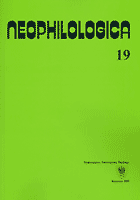Néologie sémantique et noms propres : le cas de l’antonomase
Semantic neology and proper names: the case of antonomasy
Author(s): Agnieszka KonowskaSubject(s): Language and Literature Studies
Published by: Wydawnictwo Uniwersytetu Śląskiego
Keywords: proper names; common names; eponyms; semantic neology; antonomasy; connotations; interpretative semantics
Summary/Abstract: The majority of linguists is currently of an opinion that proper names are asemantic. Disagreeing with this assumption, the author of the article, making use of an example of antonomasy, makes an attempt to prove that they have a semantic meaning. As a result of it, one can speak of the changes of meaning, not its appearance out of nothing in the case of their transfer to the category of common names. The analysis of the mechanisms of semantic changes taking place during eponym creation, or, in other words, appellatives deriving from nomina propria, is preceded by a complete overview of theories concerning antonomasy. In order to explain the antonomasy mechanisms governing the change of a morphosyntactic category (nomen proprium – appellativum), as well as semantic changes accompanying it, the notions such as connotations and so called charge culturelle partagée by R. Galisson were used. Also, the author of the article relied on F. Rastier’s theory concerning inherent and afferent sems. In the analysis of the process of moving names from one category to another during which afferent sems of proper names become inherents deriving from their common names, a special emphasis was put on the role of paralinguistic reality (culture, needs of language users).
Journal: Neophilologica
- Issue Year: 2007
- Issue No: 19
- Page Range: 62-83
- Page Count: 22
- Language: French

